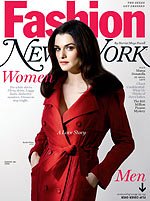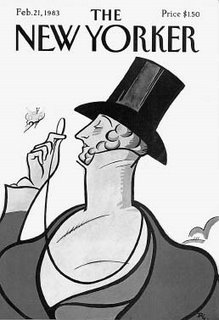

This week's installment of In the Penny Press will focus on the current New Yorker and the current New York magazine. I thought it might be a good idea to write about them now, since they'll very shortly be LAST week's issues. I never claimed stevereads would be as cutting-edge prompt as towelroad or pink is the new blog, but there's no excuse for lollygagging.
The New Yorker was a mixed bag, as always. The normally intolerable 'Shouts & Murmurs' feature was this week temporarily turned over to somebody who's actually funny, the mighty George Saunders, who turns in a hilarious little piece on the recent proclamation by Iran's President Whackjob that Persian words or constructions should be found to replace all foreign words.
As with all true humor essays, this one can't be summarized or excerpted without killing it dead, so I'll have to rest on doing two things: telling you it's really good and urging you to snap up the issue before it disappears.
I won't say Saunders is worth the price of admission alone, because there are one or two other things to warrant your attention. For instance, there's a spry, lively piece on Upton Sinclair that gains points by not skirting away from what a bombastic mo-ron Sinclair could be. Here's a good quote, although the whole thing is good:
"The shock created by 'The Jungle' was extraordinary, but it didn't produce what Sinclair hoped for - outrage over the exploitation of workers, and the first steps toward the defeat of capitalism. 'I aimed at the public's heart, and by accident I hit it in the stomach,' he later said, in perhaps his sole public witticism. Roosevelt brushed off the call for socialist revolution, and though he acted vigorously on contaminated food, his measures were neither as vigorous nor as comprehensive as Sinclair wanted. The writer, hanging around Washington, pestered the President with cables and protests, until Roosevelt, losing patience, wrote to Frank Doubleday, Sinclair's publisher, 'Tell Sinclair to go home and let me run the country for a while.'"
Hee. Even after all this time, he still has all the best lines.
The piece's best feature is its honesty: Sinclair, like so many authors ('Uncle Tom's Cabin,' anyone?), is remembered only because he struck a nerve in the zeitgeist - his actual writings are entirely without literary merit. The rant I'll avoid here (because you've all likely heard it before) is the one about how countless schoolkids are forced to read a piece of crap like "The Jungle" every year, and because they have crappy, ignorant teachers, they have NO IDEA that what they're reading ISN'T GOOD. It poisons their entire idea of reading, and where is there the help, the countervailing force, to set that aright? I myself am such a force, but Hell! I can't be personally present in every dorm room all across the country!
Unfortunately, the issue also featured a short story by Richard Ford, an author who has, on infrequent occasion, been kinda-sorta good. Alas, this present short story, "How Was It To Be Dead?" was wretched - swamped with cliches couched so cleverly that you get the immediate and dismaying impression the author has somehow convinced himself they AREN'T cliches, that he's voor-trekking in virgin territory.
Honestly, what are we supposed to DO with stories like this? Ford is a known name, like Updike or Munro, and the New Yorker can't rightly refuse their refuse. But when it's served up to the rest of us, all unsuspecting, on glossy paper at premium price, what are we to make of it? I wasted exactly four minutes of my life determining that this story was a steaming pile of self-indulgent horsepoop, and still I forged ahead, spending another 8 minutes actually reading it to its end - because, theoretically, you can't just up and IGNORE a Richard Ford short story, right?
We need to arrive at a new arithmetic of fame, I think - one in which the more famous you are, the MORE you need to work, not the less ... I don't know ... I'll perfect it and report back.
And of course I read John Lahr's fascinating piece of stagefright with an extra quiver of enjoyment. Lahr's piece cites such stratospheric giants as Olivier who were often physically crippled by stagefright. Reading it was fascinating in its own right, made all the moreso by personal connections.
Oh, not personal connections to Olivier - calm down, you frothing maries! no, personel connections because once upon a time, when Dick Burbage was still squeezing every bit of juice out of every shilling he ever saw, I myself acted upon the stage - and of course my young friend Sebastian is, despite his youth, a tried and weathered veteran of the stage - and more than that, the two of us, despite personal differences too numerous to mention (he prefers 57-count multi-weave; I prefer dirt under a thick bush), are utter strangers to stagefright. Just isn't something either one of us is wired to feel. Which raises interesting questions about exactly what it is, and why giants like Olivier and Holm are prey to it. Surely possessors of such talent are past worrying that it'll simply wink out on them if enough people are watching?
Over in New York magazine, the Approval Matrix was its usual snarky, wonderful self, pinpointing everything worth pinpointing in the last week on a neat little four-square graph. In the Highbrow Brilliant category, there's this: "Ryan Gosling in 'Half Nelson' - until further notice, he is Hollywood's best young actor." In the Lowbrow Brilliant corner, we have this: "Martin Landau on 'Entourage.'"
In Highbrow Despicable, there's this: "Google gets snippy about people using 'google' as a verb." And in the always-reliable Lowbrow Despicable: "Hacktastic director Brett Ratner signs on for a remake of 'The Boys from Brazil.'"
In the Books section, our editors give us the occasional 'Off the Shelf' feature where they ask an author to expound on five books in their library.
The author they picked this time around is Jennifer Egan, whose novel 'The Keep' is currently featured at the front of every Barnes & Noble store in the entire country. Egan picks "The Wizard of Oz," "The Beauty Myth," "Underworld," "The Collected Poems of Emily Dickinson," and "White Teeth."
Two things are simultaneously obvious from the piece. First (thanks to a photo inserted): Egan is beautiful. Second (thanks to all the words appended): Egan's ... well, she ain't Virginia Woolf.
Although for all that, it's her breathless elevation of "White Teeth" ('masterful' for cripes sake, with Emily Dickinson sitting right there in the room) that left the worst taste in my mouth. When the Hell will that negligible piece of unplotted hackery stop being praised?
And lastly, there's David Edelstein's review of the new movie "Mutual Appreciation," which none of you will see and all of you should, and which stars, among others, Justin Rice - a smart young man who's a) oddly addictive to know in person and b) one-half of the rock band BishopAllen (whose music, alas, I still don't like at all, but you might). In this movie, about a feckless blackout-alcoholic talented loser, Justin's thesbian talents aren't seriously taxed ... but just you wait! If he can be lured from the ranks of rock-stardom-in-waiting, he'll make a big name for himself as an actor. Kid's got mineshafts of talent.
And there you have it! The nuts and bolts of two very-nearly-oudated magazines! More to come!

1 comment:
I thought the REALLY fearsome piece about stagefright (which, incidentally, ended up answering the question you and I had about Stephen Fry's lack of a leading vehicle like "House") is how few of the people it hit hardest had ever felt it before. We THINK we haven't got it ... until we think we do...
-- Sebastian
Post a Comment